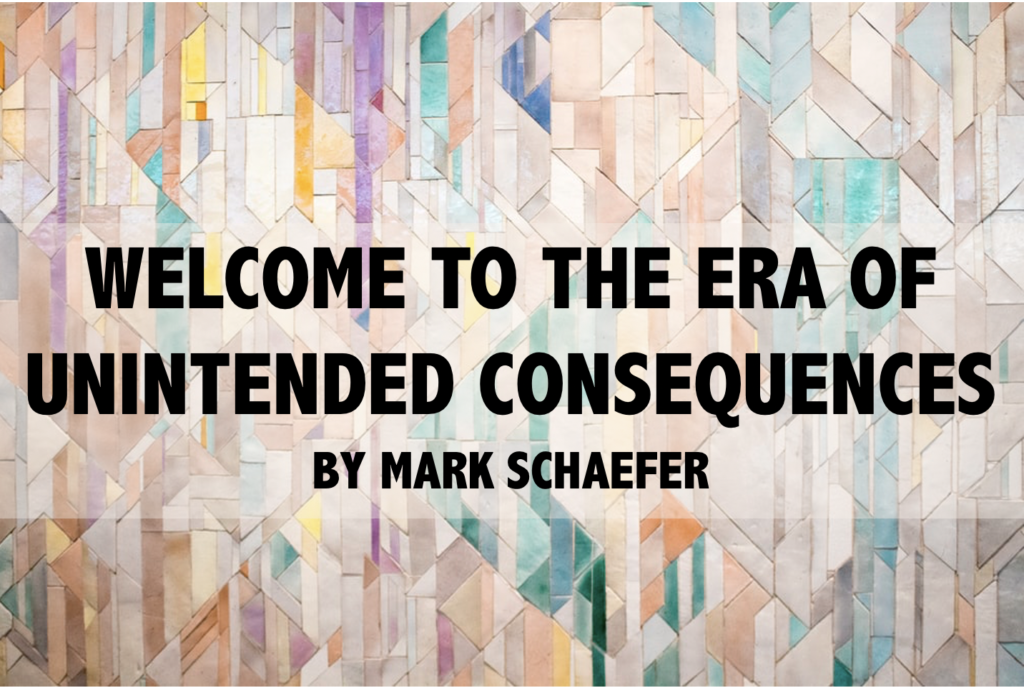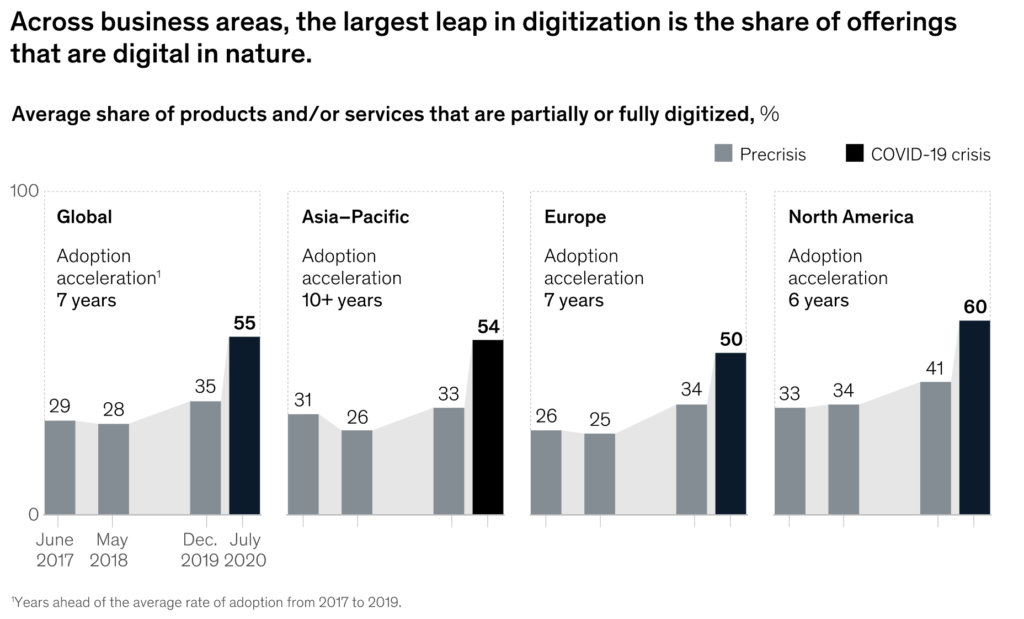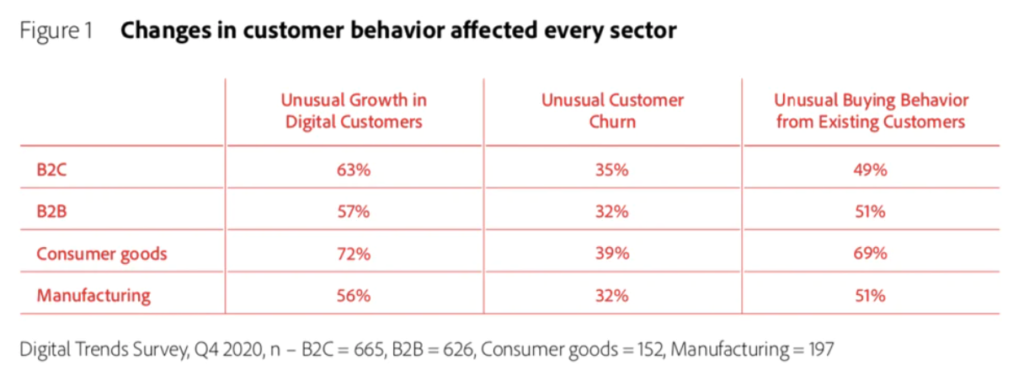
The world’s people have been racked for years by pandemic era fear, grief, and economic upheaval. Some of the consequences are obvious. We’ve learned new ways to work, shop, learn, connect, date, work out, and entertain ourselves, to name a few. But perhaps our marketing future will be determined by unintended consequences we can’t fathom at the moment.
It’s going to take a long time to sort out what goes back to normal and what new norms transcend the pandemic. I’d like to share a weird little story that illustrates a much more subtle, and profoundly more important, business consideration as we transition from reaction to a crisis to the adoption of a new way of life. It starts with a playful child.
A story of unintended consequences
As pandemic restrictions thawed, my wife and I decided to attend a socially-distanced community event. We were happy to see old friends — behind their masks, of course!
We stood in the sunshine talking to a young couple with a two-year-old toddler. We were close to this family and delighted in seeing how much this little girl had grown since we last saw her.
While the adults chatted, the little girl toodled over to a grassy patch, pulled up some leaves, walked over to me, and deposited them on my shoes. She repeated this process with flowers, old leaves, and little stones. She was decorating me!
Normally I would pick her up, compliment her on her artwork and make her giggle.
But I couldn’t. You just don’t touch each other in a pandemic. I couldn’t interact in a normal way with this child. Nobody could. And it has been that way for more than a year. She then started to run over and play with other children, but her mother pulled her back.
Let’s dissect this seemingly insignificant interaction and think through the possible impact. What socialization lessons are being imprinted here? What is the child learning?
- “It’s not safe for anybody to connect with me in a physical way except mom and dad.”
- “I can’t really see how people react to me behind those masks. I don’t see smiles. Do they like me?”
- “I would like to play with these other children but every time I try, mommy carries me away. It must not be safe.”
I’m not a psychologist. I don’t know if these statements could be true or if they will matter in the long-term.
But I am an observant marketer. And what I’m learning is that people have been changed in millions of ways both large and small. Some of these changes are obvious. The consequences of other changes — like the story of the little girl — might not be apparent for years. That is a very big deal for our profession.
Sociologists and doctors are already beginning to call this demographic Generation C for COVID. They are predicting that the pandemic will be an experience that forms their ability to communicate and socialize, perhaps forever.
Your research is probably meaningless
The other day a connection on LinkedIn posted a research paper about consumer content consumption that was authored in 2018. It was great work. And probably meaningless.
We simply don’t know what’s happening in the world right now and we certainly can’t trust a report from 2018. I’m not sure we can trust any consumer research that has not occurred in the last few months. The pandemic isn’t just changing children. It’s changing almost everyone in some way.
Here’s one chart from McKinsey that boggles the mind. On a global average, the pandemic has accelerated online commerce by SEVEN YEARS.

This strikes at the heart of marketing discipline. We want to predict the future based on some trendline that started in the past. But the future has been re-written in the last 12 months, and our trendlines will be interrupted with unintended consequences. We might have to reimagine marketing strategy for the time being.
Martin Lindstrom suggests that an entire generation is being conditioned to have Post Traumatic Stress Disorder. We have lived in fear and isolation for so long that we are literally being re-wired. Columnist David Brooks wrote that the accumulated isolation and lack of normal routines made him feel he lost his sense of purpose.
One year into the societal convulsions caused by the coronavirus pandemic, about a fifth of U.S. adults are experiencing high levels of psychological distress, including 28% among those who say the outbreak has changed their lives in “a major way.”
How is this going to show up in the world?
We’ve been driven by unintended consequences
To think about how unintended consequences might play out in the future, we can simply reflect on what happened at the start of the pandemic.
Let’s say we’re smart marketers trying to forecast what might happen to certain businesses if a pandemic hit. What would we think might happen when people are locked in their homes all over the world, gripped with fear, and using the web as their lifeline to work, learn, and play?
- Would we have predicted a building boom in construction and home improvement? (Home Depot guessed wrong — they started laying off employees and reducing inventory just as demand exploded!)
- Could we have guessed that Clearasil would be in short supply? Wearing masks all day caused acne.
- Would we have had the idea to invest in companies making baby pools, RVs, or kayaks?
- Who would have connected a deadly global plague to record sales of luxury boats, beach property, and toilet paper?
My point is, our economy has been driven by a tide of unintended consequences — some happy, some sad — and as the pandemic winds down, we’re in for a new tidal wave of unexpected consumer behaviors.
Unintended consequences and marketing
How do we adjust to this quirky new reality?
I think the number one skill for a marketer right now is humility. We need to survey, sit and listen, and re-connect with our customers humbly. We need to test every assumption we ever had about our customers, and then re-test. We need to pay close attention to nuance. And we certainly cannot be basing our plans on 2018 data!
And in case you’re thinking, “Well I work in manufacturing, this won’t impact me,” A report from Adobe shows very weird consumer behavior in every segment:

There are going to be a lot of very weird things happening in the next few years. It is the Era of Unintended Consequences.
It is also an era of unprecedented opportunity. The pandemic is a fracture in the status quo, arguably the largest and most concentrated shift in consumer behavior in history.
Every small shift opens up new or under-served customer needs, whether you are in B2B, B2C, education, non-profit or any other organization. New momentum begins by rapidly applying historic strengths to solve new problems.
Your job is to be a trend collector. Be aware of every small change happening around you. Quickly assess if you can apply your resources in a new and profitable way.
If you do that effectively, The Era of Unintended Consequences will be the greatest period of business opportunity in your company’s history.
 Mark Schaefer is the executive director of Schaefer Marketing Solutions. He is the author of several best-selling digital marketing books and is an acclaimed keynote speaker, college educator, and business consultant. The Marketing Companion podcast is among the top business podcasts in the world. Contact Mark to have him speak to your company event or conference soon.
Mark Schaefer is the executive director of Schaefer Marketing Solutions. He is the author of several best-selling digital marketing books and is an acclaimed keynote speaker, college educator, and business consultant. The Marketing Companion podcast is among the top business podcasts in the world. Contact Mark to have him speak to your company event or conference soon.
Illustration courtesy Unsplash.com


